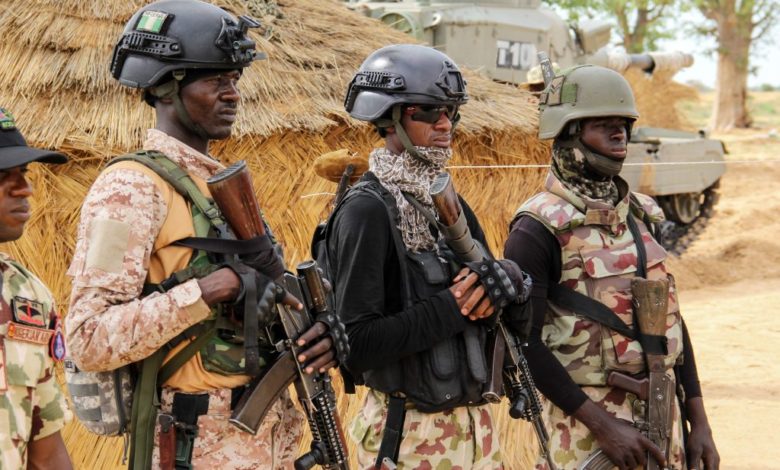Overmilitarisation As Nigeria Battles Insecurity

As Nigeria grapples with insecurity that seems to be intractable, the government has responded with an escalation in military actions to obliterate terror and criminal groups in five geo-political zones out of six where the challenge is prominent.
But there are worries already about the escalating use of the military for internal security which has led to an unprecedented deployment of special forces and airstrikes in the past few years. Experts say this could further weaken the police, worsen human rights violations and push some victims to join enemies of the state.
On Thursday, September 3, the Nigerian Defence Headquarters in Abuja held a press conference on ongoing military operations across the country, a similar briefing was done in August .
The military operations are currently in five geopolitical zones — Northeast, Northwest, Northcentral, Southwest and South-South — comprising ground, air and naval components that are occurring simultaneously.
HumAngle has tracked over 30 airstrike briefings from the military between January and August 2020, with Borno, Zamfara, Kaduna, Katsina, Niger and Nasarawa states experiencing much of these airstrikes conducted from airbases and temporary forward operating bases.
Chidi Nwaonu, a defence expert and Director of Peccavi Consults, expressed concerns on the increasing use of airstrikes by government forces across the country including within close proximity of Nigeria’s capital city, Abuja.
He said the subtext to all this is that Nigeria is conducting airstrikes within its own territory and in over 67 per cent of its geopolitical zones, North East, North West, North Central and South-South.
The military continues to battle Boko Haram and its splinter Islamic State West Africa Province (ISWAP) that have a stronghold and foisting insurgency in the Northeastern part of the country. The Defence Headquarters have confronted insurgency in the area with Operation Lafiya Dole to end the reign of terrorists that has killed 30,000 people and displaced over 2.3 million.
According to the recent defence headquarters press statements released between August 27 and september 2, troops have maintained clearance operations and constant Intelligence Surveillance Reconnaissance missions as well as intensive airstrikes.
In the Northwest, Operations Sahel Sanity and Hadarin Daji continued to target armed groups terrorising rural communities and commuters, including an ambush laid on bandits who attempted to invade Gobirawa village in Katsina.
The violence in the region has displaced over 160,000 people while causing about 41,000 more to flee to Maradi in the neighbouring Niger Republic.
In the oil-rich South-South and Southwest regions, troops of Operations Delta Safe and Awatse sustained operation against militants, pirates and oil thieves, with the Navy also conducting maritime operations in the same areas. Additionally, in the North-Central zone, troops of Operation Safe Haven, Thunder Strike and Whirl Stroke conduct operations against terror groups, notably Darul Salam in Nasarawa and Kogi.
The Nigerian Air Force has also dedicated attack helicopters and ISR aircraft stationed in Nnamdi Azikiwe International Airport to provide air support to ground troops.
Saadatu Falila Hamu, a national security specialist and managing partner at Hamu told HumAngle the military has taken over the role of internal security of the country from the Nigeria Police.
Saadatu added that this has created not only a vacuum in terms of the role the police plays in human security and protecting lives, but also undermines the co-responsibility the military has to protect the territorial integrity of the country against external aggression.
Insufficient and inefficient policing has been blamed for the surge in the use of the military, to address the situation, Nwaonu says policing strategy needs to change to be more people and community-centred.
“Several key things are wrong with the police: leadership, numbers, training, doctrine, equipment and deployment. First and most important is an internal security review, identifying the key threats and trends,” he added.
In an interview with HumAngle, Audu Bulama Bukarti, an analyst on extremist groups in Sub-Saharan African at the Tony Blair Institute said, “Learning from the impact of military operations in the Northeast and UNDP Journey to Extremism study, which disclosed that 71 percent of violent extremist recruits interviewed said government force and abuse — either the killing or arrest of a family member or friend — was a tipping point.”
He recommended the use of justified force based on intelligence to prevent human right violations and a situation in which state action pushes victims to join enemies of the state.
Bukarti added that the weak sense of national identity and connection to the state due to poverty, lack of infrastructure and government presence is contributing to insecurity.
“Government needs to deliver its own part of the social contract.”
Saadatu shared similar thoughts on de-escalating the use of the military. She emphasized the need for community engagement, policing and social intelligence to resolve the security crisis ravaging parts of the country, instead of escalation in military deployment.
“A militarised approach will only quell the violence that is happening at the moment but it will not resolve it in the long way, we must address the socioeconomic triggers peculiar to each community,” she said.
Until a reversal in the current trend happens, Nigerians will continue to see more deployment of the military personnel and equipment across the country.
Support Our Journalism
There are millions of ordinary people affected by conflict in Africa whose stories are missing in the mainstream media. HumAngle is determined to tell those challenging and under-reported stories, hoping that the people impacted by these conflicts will find the safety and security they deserve.
To ensure that we continue to provide public service coverage, we have a small favour to ask you. We want you to be part of our journalistic endeavour by contributing a token to us.
Your donation will further promote a robust, free, and independent media.
Donate HereStay Closer To The Stories That Matter




